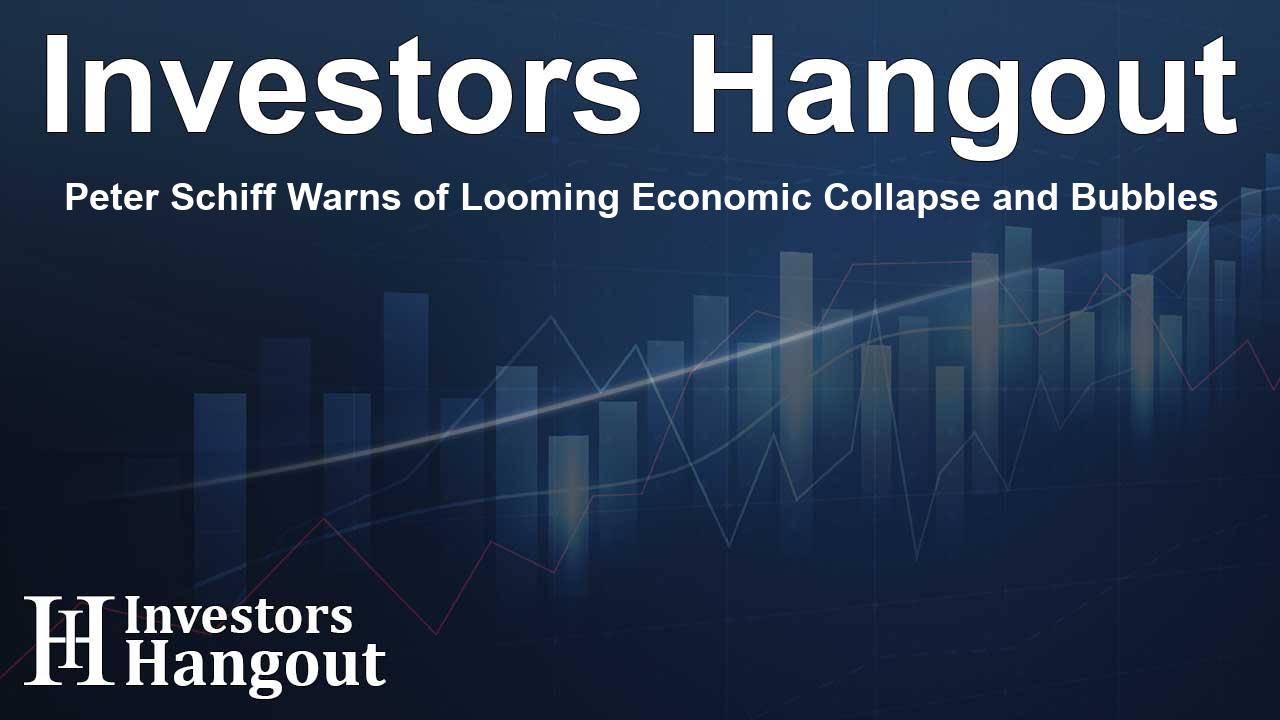Peter Schiff Warns of Looming Economic Collapse and Bubbles

Peter Schiff Discusses Economic Bubbles Over Two Decades
Peter Schiff, a notable economist and podcast host, has always been a figure of spirited discussions about the state of the economy. His insights are frequently characterized by their contrarian nature, positioning him at odds with mainstream views. In a recent conversation, he delved into the U.S. economy, inflation, and raised pointed critiques regarding the rise of Bitcoin.
Understanding the "Bubble Economy" Phenomenon
Schiff asserts that the U.S. economy has been trapped in a bubble for many years, a situation he believes was exacerbated by policies during prior administrations. He highlights that following the burst of the dot-com bubble, the government has engaged in actions that have maintained a bubble economy. Schiff critiques the last two decades of debt-driven consumption, claiming that this trajectory has made the economy's current state unsustainable.
The Role of Fiscal Policies
Deepening his analysis, Schiff mentions that the Federal Reserve's monetary policies have further inflated this bubble economy. He warns that the entire economic framework is reliant on debt and excessive consumer spending, which he predicts will ultimately lead to a significant implosion due to its unsustainable nature.
Bitcoin: A Misinformed Investment?
Schiff's skepticism toward Bitcoin is well-documented. He refers to the cryptocurrency as "fool's gold", suggesting it merely imitates the properties of gold without possessing intrinsic value. Schiff argues that those investing in Bitcoin are often misled, asserting that many do not truly understand its nature. His comments emphasize that while some perceive Bitcoin as a revolutionary asset, it is fundamentally a speculative investment devoid of genuine monetary function.
Potential Changes in Perspective
When questioned about what would convince him to change his stance on Bitcoin, Schiff stated that if Bitcoin were to become a legitimate alternative to fiat currencies, he would reconsider. However, he emphasizes that it has yet to prove itself as a functioning currency in everyday transactions.
The Value of Gold and Silver
In contrast to his outlook on Bitcoin, Schiff remains a staunch advocate for investing in gold and silver. He believes that these precious metals serve as a safe haven against inflation and economic volatility. Schiff points to the trend among central banks of increasing their gold reserves as indicative of a broader confidence in gold's long-term worth.
Investment Opportunities in Precious Metals
Currently, Schiff observes that while gold prices hover near record highs, silver remains undervalued at approximately $33 an ounce. He encourages investors to consider silver as a promising investment due to its potential for significant price appreciation. Schiff also highlights mining stocks as a viable investment route, likening them to the next wave of investment opportunities without the risks associated with cryptocurrencies.
Future Economic Outlook
Looking ahead, Schiff foresees worsening economic conditions, attributing this to soaring levels of debt and persistent inflation. His warnings suggest that things will deteriorate further before any recovery occurs, underscoring a critical need for structural reforms in economic policy.
Strategic Wealth Preservation
For investors keen on safeguarding their assets, Schiff recommends diversifying portfolios to include international stocks, emerging markets, and tangible commodities, including energy and agricultural investments. His central message is clear: shift away from dollar-based assets and invest in tangible goods.
Despite controversy surrounding his viewpoints, Peter Schiff raises important discussions surrounding inflation, debt, and the unsustainable nature of the economic practices of the past two decades. His warnings encourage a proactive approach towards investing, suggesting that being properly positioned ahead of potential economic downturns is crucial for financial stability.
Frequently Asked Questions
1. What is Peter Schiff's main argument about the economy?
Peter Schiff argues that the U.S. economy has been in a bubble for over 20 years, driven by unsustainable debt and consumption.
2. Why does Schiff criticize Bitcoin?
Schiff refers to Bitcoin as "fool's gold", believing it lacks intrinsic value and is mainly a speculative asset.
3. What investments does Schiff recommend?
Schiff recommends investing in gold, silver, mining stocks, and diversifying into international assets.
4. How does Schiff view the future of the economy?
Schiff predicts that economic conditions will worsen before they improve, emphasizing rising inflation and unsustainable debt levels.
5. What does Schiff believe about preparing for economic downturns?
He stresses the importance of being properly positioned financially before a collapse, advocating for tangible asset investment.
About The Author
Contact Hannah Lewis privately here. Or send an email with ATTN: Hannah Lewis as the subject to contact@investorshangout.com.
About Investors Hangout
Investors Hangout is a leading online stock forum for financial discussion and learning, offering a wide range of free tools and resources. It draws in traders of all levels, who exchange market knowledge, investigate trading tactics, and keep an eye on industry developments in real time. Featuring financial articles, stock message boards, quotes, charts, company profiles, and live news updates. Through cooperative learning and a wealth of informational resources, it helps users from novices creating their first portfolios to experts honing their techniques. Join Investors Hangout today: https://investorshangout.com/
The content of this article is based on factual, publicly available information and does not represent legal, financial, or investment advice. Investors Hangout does not offer financial advice, and the author is not a licensed financial advisor. Consult a qualified advisor before making any financial or investment decisions based on this article. This article should not be considered advice to purchase, sell, or hold any securities or other investments. If any of the material provided here is inaccurate, please contact us for corrections.
